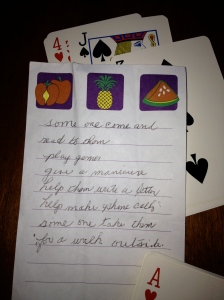DON’T FUN AND GAMES HELP PARENTS AGE WELL?
I remember my grandmother played Canasta with a group of ladies. They cleaned their apartments, polished the silver, made the glassware sparkle, and served lovingly-prepared food and of course, deserts. They shared camaraderie, if not their special, secret recipes.
A modern-day version is going on with one group of 70-year-olds. Seems like a good idea. They just have fun–playing tile games (eg. rummy cube) once a month. They contribute pot-luck for the luncheon. No stress. No competition. “Not like bridge,” said one player. “We talk and play. The games take more luck than strategy.”
Many contemporaries play bridge–either because they love it or they believe it will help memory. This sparked my thinking about last Saturday’s post: Senior games and Cognitive Gains. My playing-for-fun friend is also a bridge player, who plays bridge with her friend’s 90+-year-old, vision-impaired mother at least once a month.
Thoughts turn to my 88-year-old cousin in assisted living 3,000 miles away. She’s alone a lot; doesn’t avail herself of many of the facility’s activities. Her choice. Her reasons. For example, she plays Bingo on scheduled days, but doesn’t attend movies (she enjoys movies) because she says the chairs are uncomfortable for her.
A conversation with a staff member informs me the “Bingo chairs” are near the “movie chairs” and she could just move one over. Of course, her mobility problems won’t allow that kind of “just moving.” She’s evidently reluctant to ask for help (and evidently no staff person offers).
It may not make sense to us, but it does to her–and that needs to be our mindset. Some people thrive in assisted living. Others don’t. Could the boredom problem that be partially solved by fun games that we could bring over?
 When we visit care facilities why can’t we take a board game or cards with us, perhaps play while there, then leave the game? I’m thinking there are often old Scrabble games in homes. My cousin does crossword puzzles by herself. Would she enjoy Scrabble? or Anagrams? So what if her short-term memory isn’t so good. Anagrams is mnemonic. Memory might improve.
When we visit care facilities why can’t we take a board game or cards with us, perhaps play while there, then leave the game? I’m thinking there are often old Scrabble games in homes. My cousin does crossword puzzles by herself. Would she enjoy Scrabble? or Anagrams? So what if her short-term memory isn’t so good. Anagrams is mnemonic. Memory might improve.
I’ll phone her most devoted daughter (I live far away), and gently suggest–if she doesn’t have a Scrabble set–that she take some cards and perhaps play gin rummy with her mother. It’s a 2-player card game that they both once played. There must be loads of other games out there. I’ll also mention the movie attendance issue.
P.S. Several years ago I asked this cousin what gifts people in assisted living would like. (I was thinking ahead about the holidays.) She made a short list that I included on a post that year.
She was new to assisted living then. Friends would pick her up weekly to play cards, go to the movies, have lunch etc. I saved the list. I notice “play games” is on line 3.
At the time I wasn’t thinking that at least one item on her list would be useful to know about—-now.
Check out “Newsworthy” (right sidebar). Links to timely information and research from top universities and respected professionals, plus practical information–to help parents age well.

